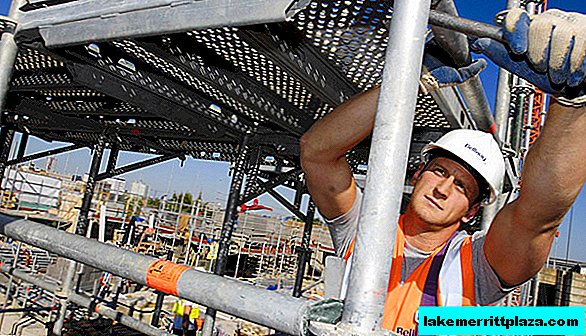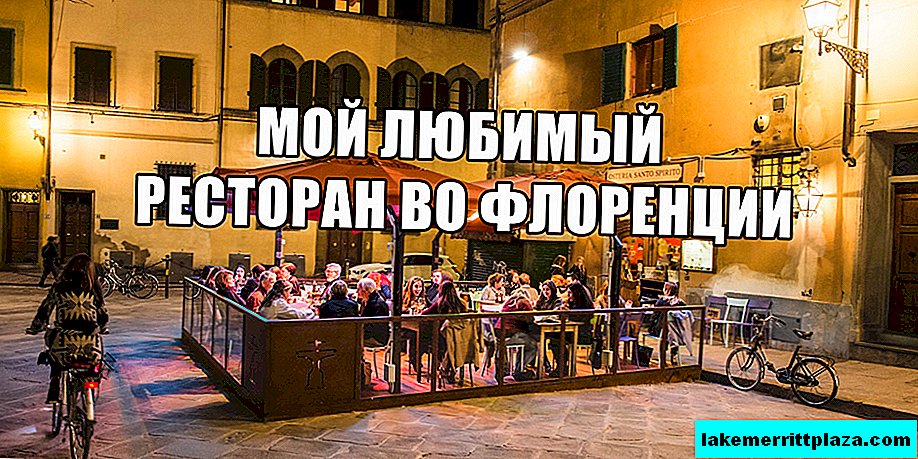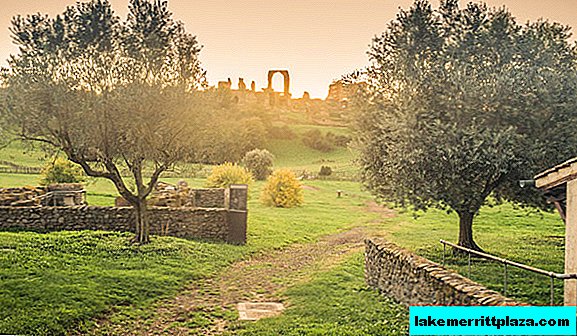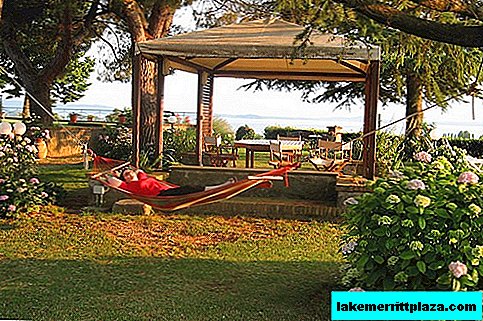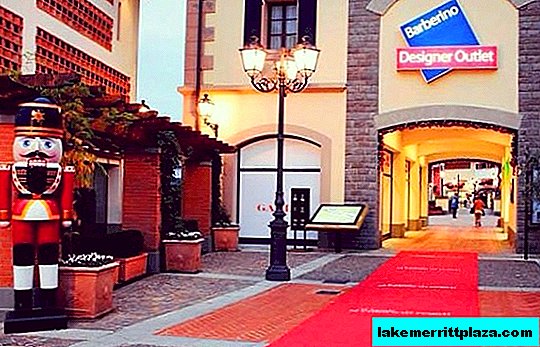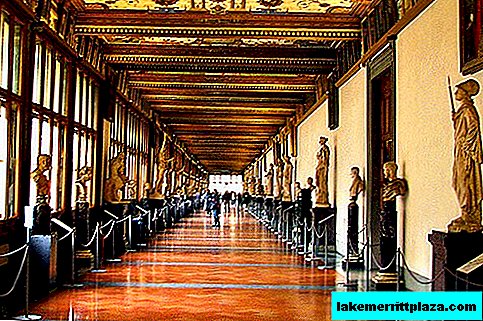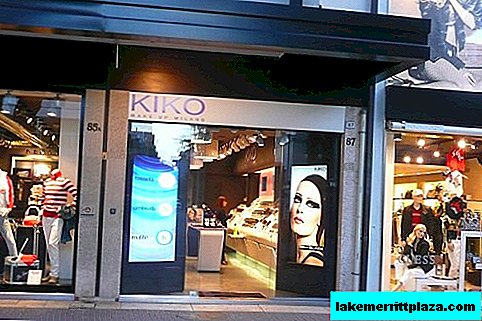Florence is the capital of Tuscany, one of the most beautiful cities in the world, a museum city. Here lived and worked Michelangelo, Boccaccio, Botticelli, Machiavelli, Dante, Da Vinci, Brunelleschi. The masterpieces of architecture, painting and sculpture of the Renaissance form entire ensembles.
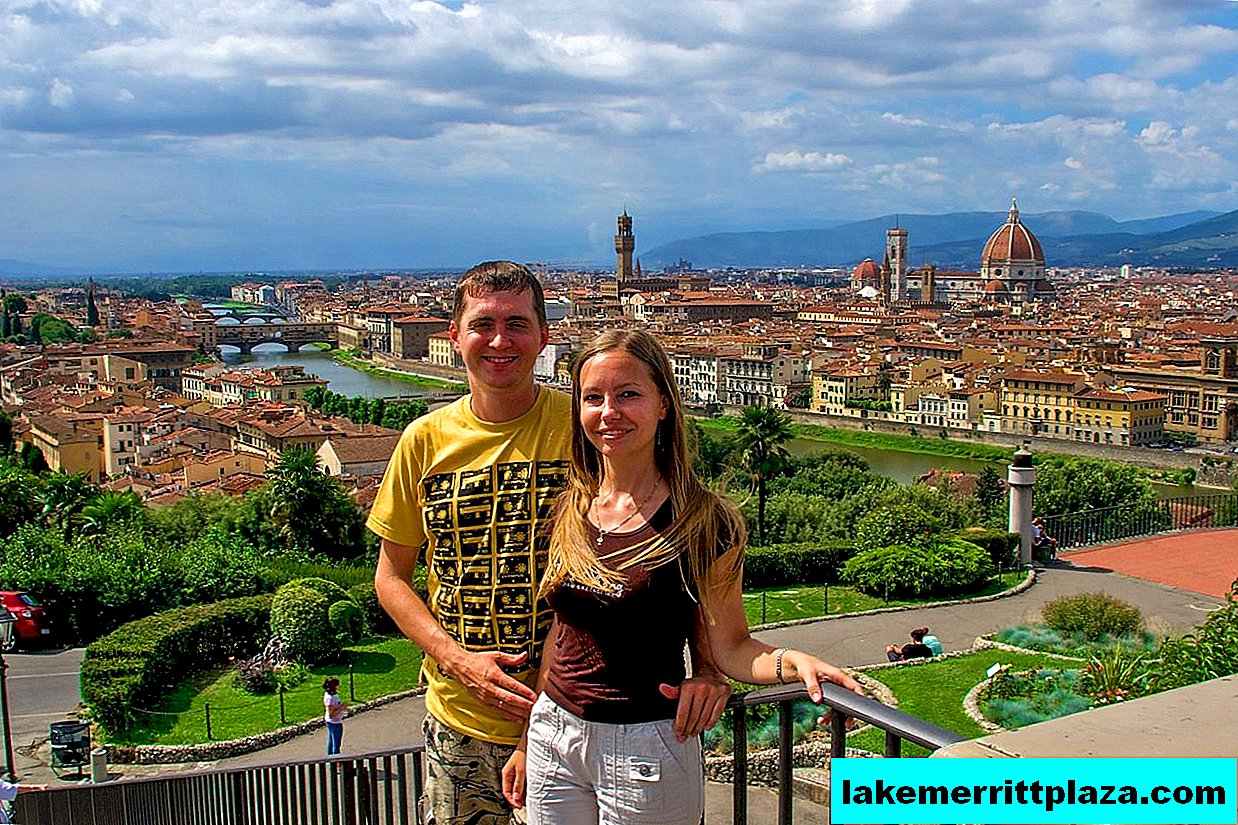
Florence (Firenze)
Florence (Firenze) is a city in Central Italy, the capital of Tuscany. It is rightfully recognized as one of the most beautiful cities in Europe and proudly carries the epithet "beautiful", "Firenze la Bella". The Renaissance originates from here. Florence is a true concentration of architectural splendor and a special atmosphere permeated by the spirit of the works of Michelangelo and Botticelli.
The city is located at the foot of the northern part of the Apennine mountains and covers an area of 102 square meters. km Its population is 377,207 people according to the census for 2013. The distance from Rome to Florence is 274 kilometers.
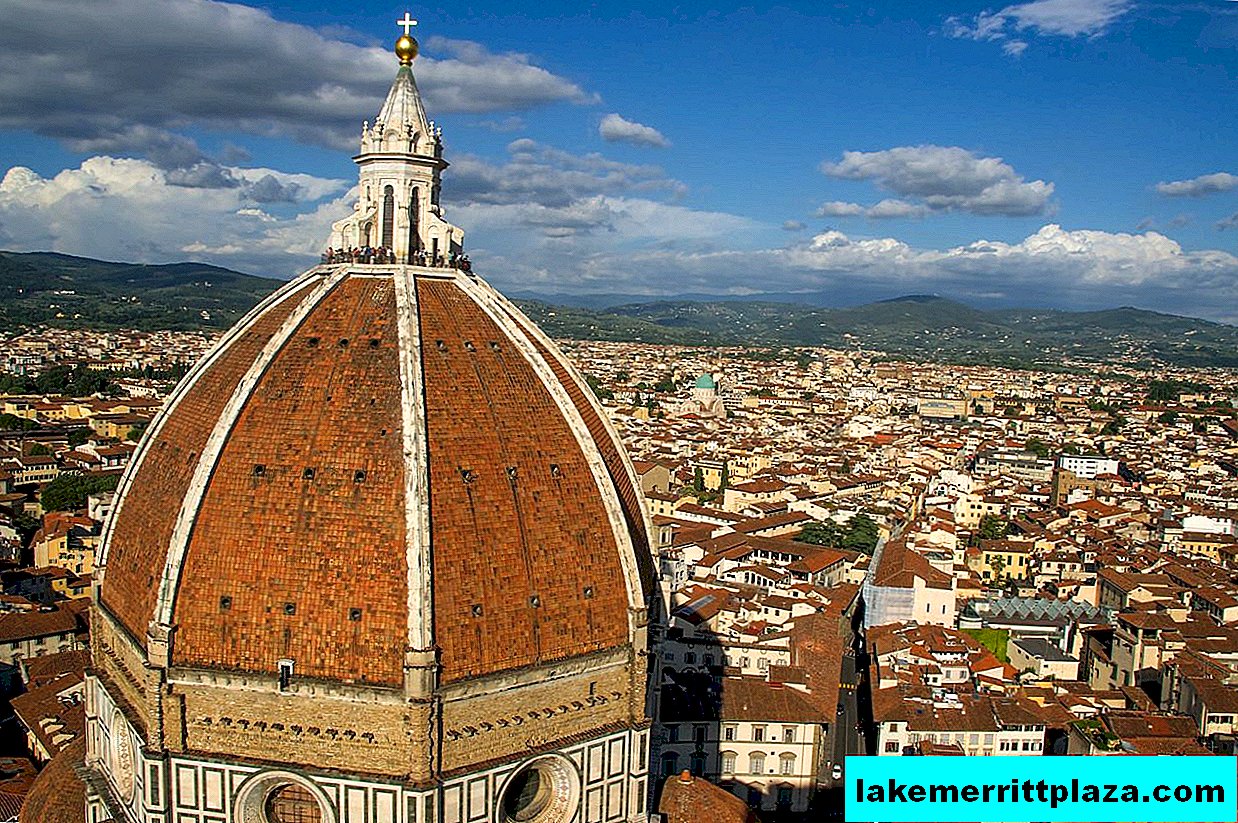
Beautiful Florence
Florence is comfortably located in the southeast of the plain of Florence-Prato-Pistoia, on three sides it is protected by low picturesque hills. Residential quarters stretched along the banks of the Arno River, lazily carrying its waters from east to west through all of Florence.
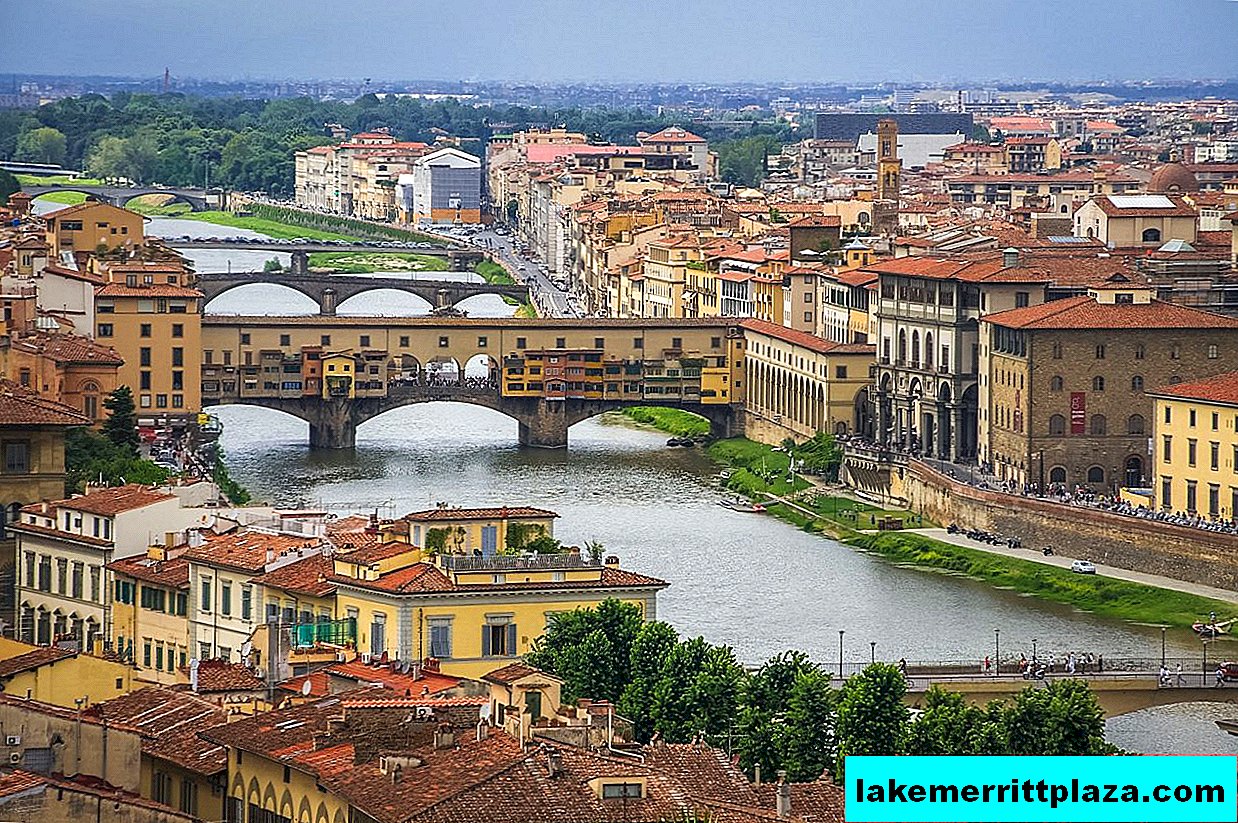
Arno River and bridges across it
"Italian Athens," as Florence is also called. The city is a museum that presented to the world artists and sculptors, whose names became icons in art. Modernity and antiquity in Florence are so harmoniously in contact with each other that you involuntarily feel like a time traveler when you see the grandeur of the palaces, the solemnity of the basilica, the spirituality of the churches, you cross over elegant bridges or relax in the shade on the old square.
Map of Florence Attractions
 Duomo Square
Duomo Square
 Cathedral of Santa Maria del Fiore
Cathedral of Santa Maria del Fiore
 Museum Opera di Santa Maria del Fiore
Museum Opera di Santa Maria del Fiore
 Giotto's bell tower
Giotto's bell tower
 Baptistery of St. John the Baptist
Baptistery of St. John the Baptist
 Church of Santa Maria del Carmine
Church of Santa Maria del Carmine
 Basilica of Santa Croce
Basilica of Santa Croce
 Orsanmichele Church
Orsanmichele Church
 Basilica of San Lorenzo
Basilica of San Lorenzo
 Signoria Square
Signoria Square
 Vecchio Palace
Vecchio Palace
 Palazzo pitti
Palazzo pitti
 Boboli Gardens
Boboli Gardens
 Bargello
Bargello
 Uffizi Gallery
Uffizi Gallery
 Ponte Vecchio Bridge
Ponte Vecchio Bridge
Sights of Florence
Duomo Square
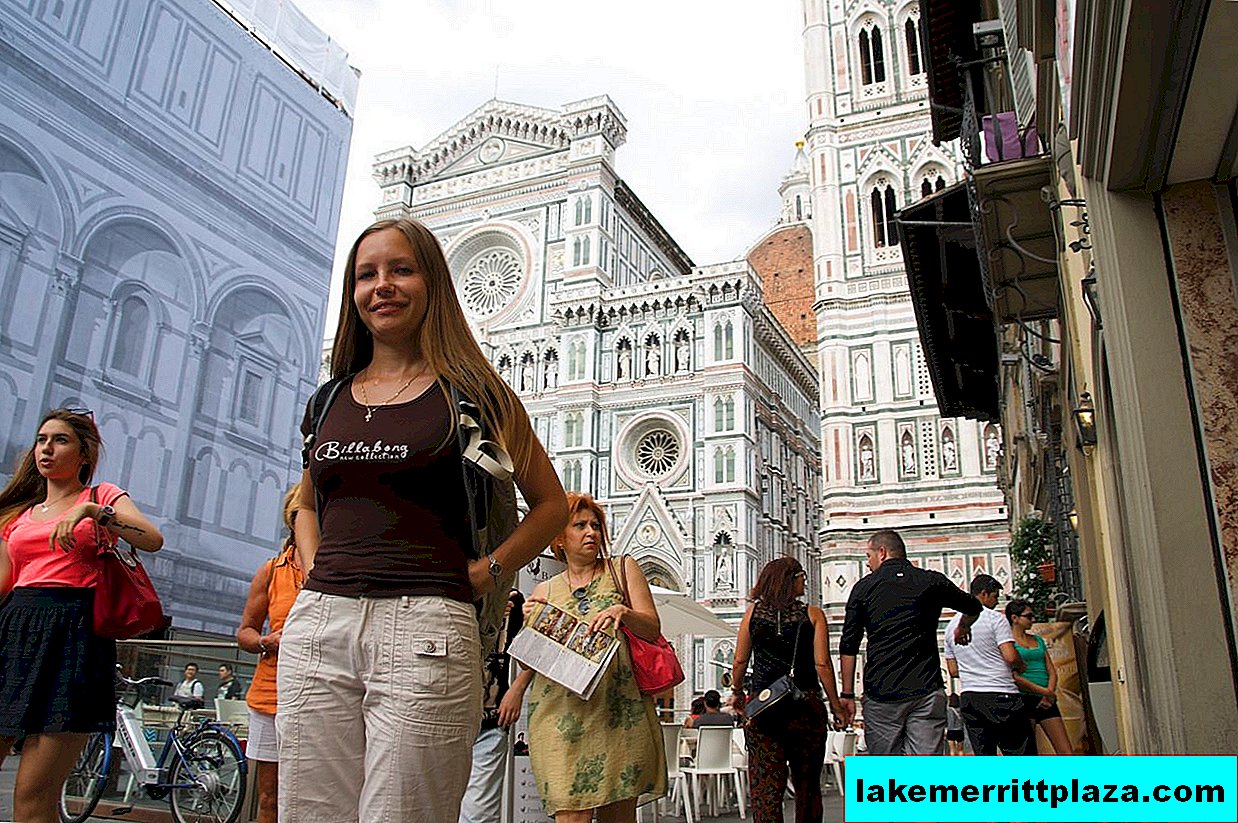
Piazza del Duomo
The sights of Florence are striking in their diversity. One of the favorite tourist destinations is Piazza del Duomo or Cathedral Square. Here are the most ancient and significant architectural monuments. In her elegantly refined appearance, the religious, artistic, cultural life of Florence is concentrated. It was here that the Cathedral of Santa Maria del Fiore was built - one of the first buildings of the Renaissance architecture.
Cathedral of Santa Maria del Fiore
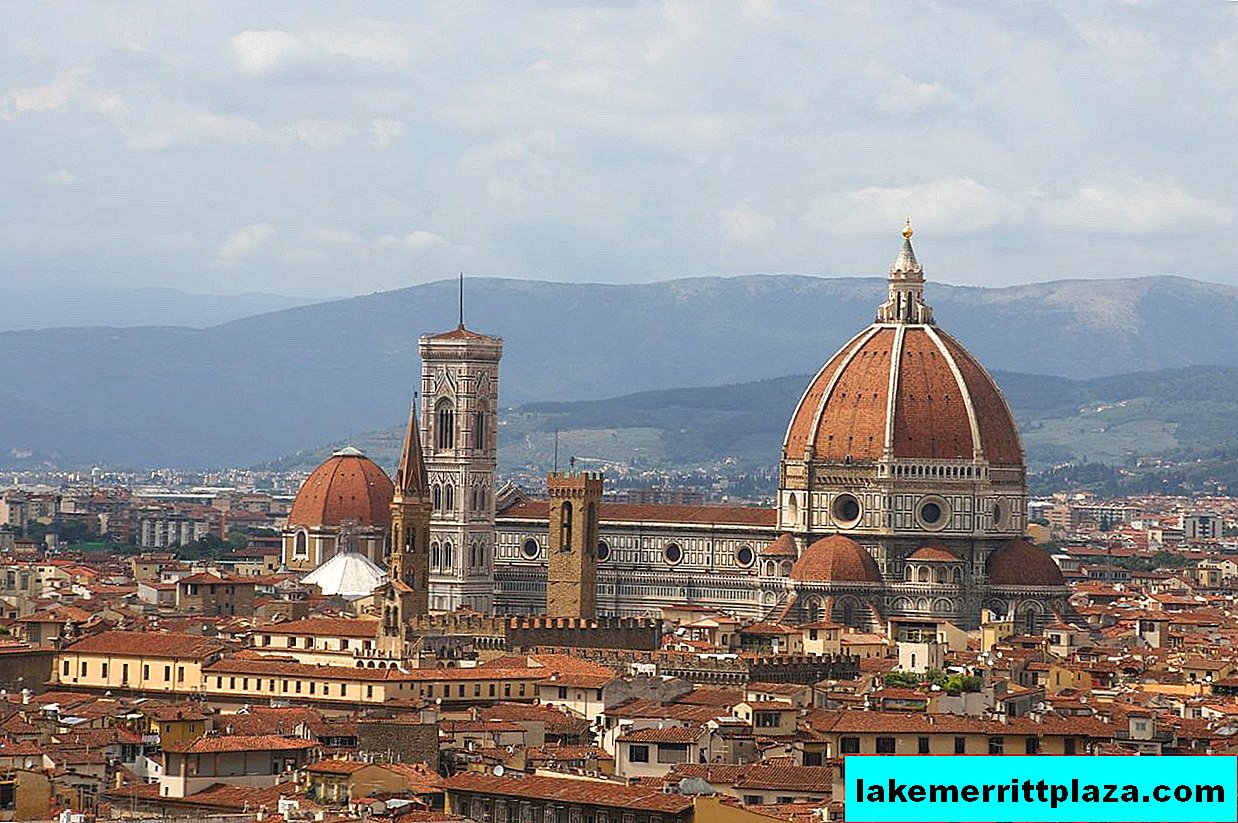
Cathedral of Santa Maria del Fiore (Cattedrale di Santa Maria del Fiore)
As conceived by the architects, the Cathedral of Santa Maria del Fiore (Cattedrale di Santa Maria del Fiore), erected on the site of an ancient cathedral, was supposed to overshadow the churches of neighboring cities, Pisa and Tuscany, and therefore, it was designed so that all residents cities could fit inside during service. Construction began in 1289, the population of Florence at that time was about 90,000 people. Although such a number of people cannot complete the cathedral, it is still the fourth largest temple in the world.
Museum Opera di Santa Maria del Fiore
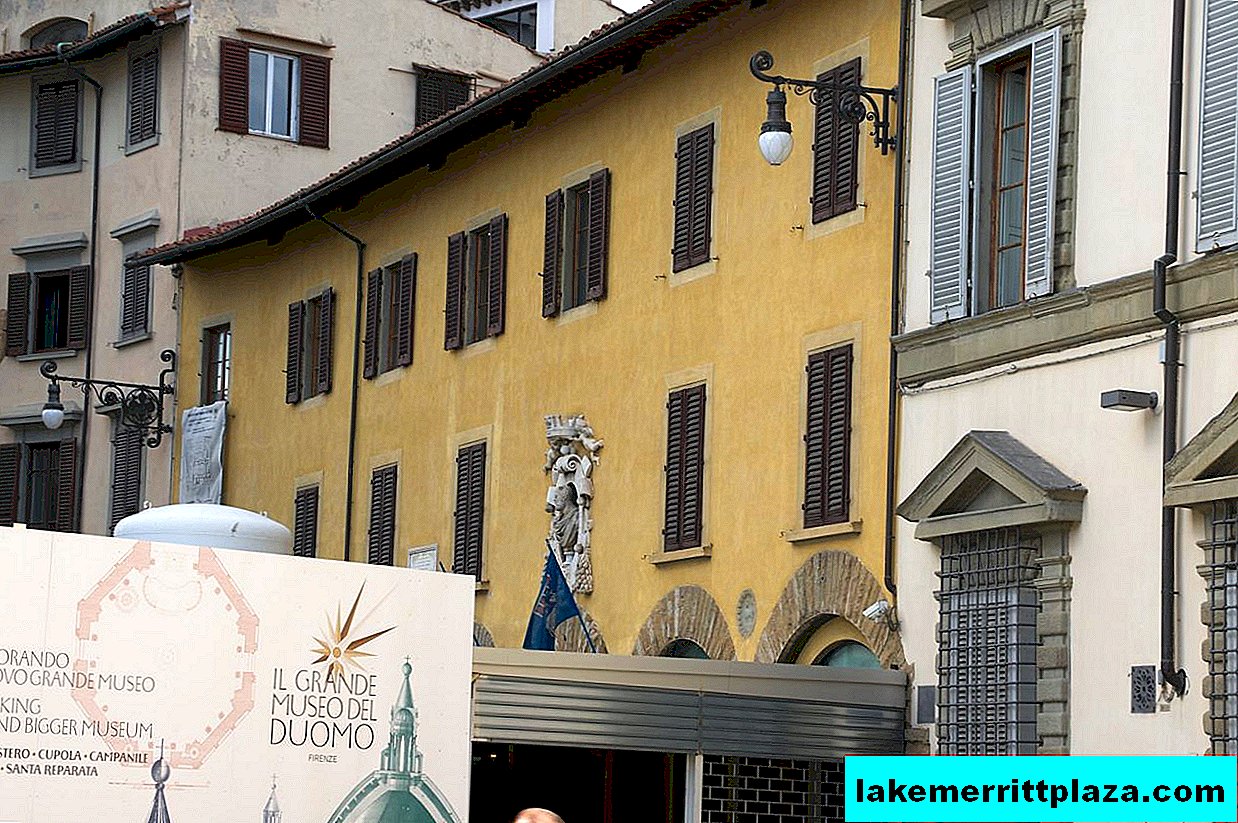
Museum Opera di Santa Maria del Fiore (Museo dell'Opera di Santa Maria del Fiore)
The Museum of the Opera di Santa Maria del Fiore (Museo dell'Opera di Santa Maria del Fiore) or the Opera del Duomo (Opera del Duomo) contains the original sculptures of the Cathedral of Santa Maria del Fiore. The sculptures with which the temple is decorated now are mostly skillfully made copies. The most famous exhibits of the museum are: “Madonna with Glass Eyes”, a wooden sculpture by Donatello “Maria Magdalene,“ Baptism of Christ ”by Andrea Sansovino.
Giotto's bell tower
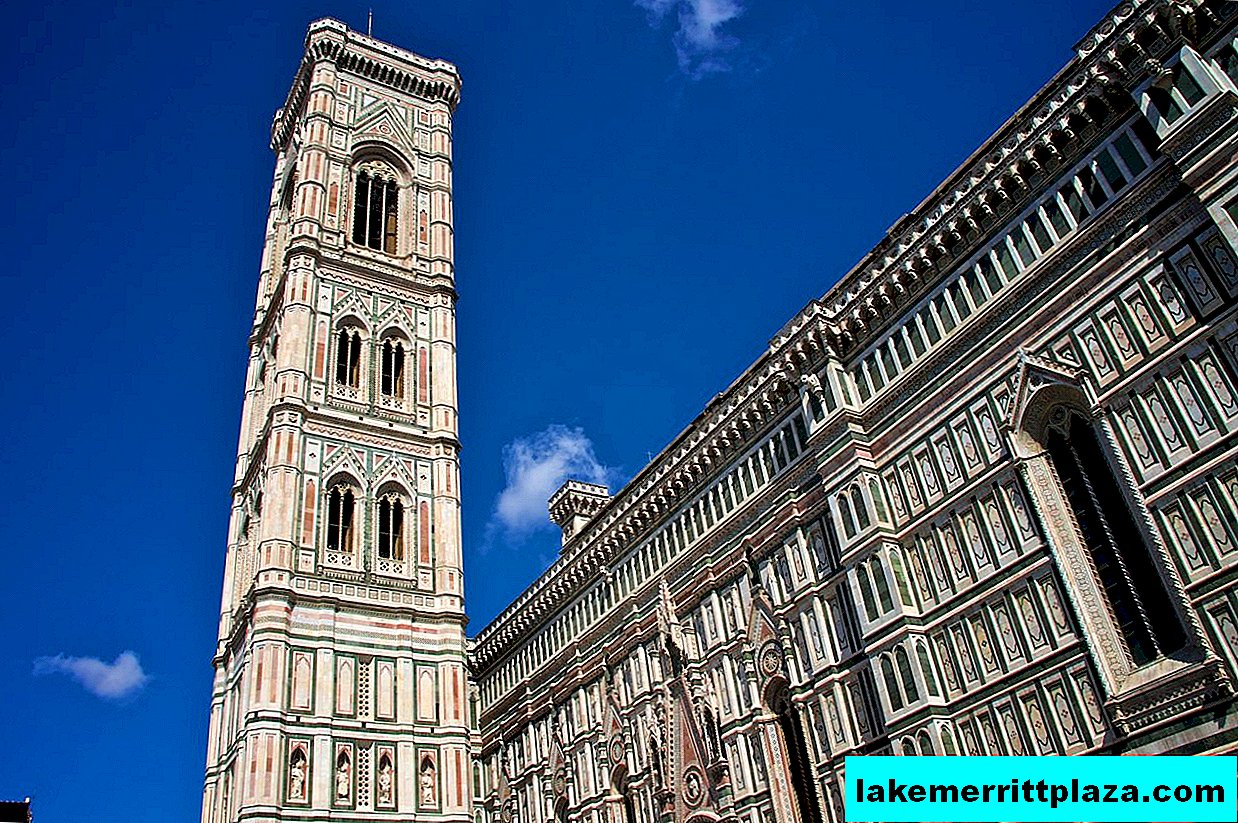
Giotto's Campanile (Campanile di Giotto)
Campanile di Giotto Campanile di Giotto stands next to Florence Cathedral. The foundation of one of the most elegant Italian campaigns was laid in 1334. The tower was for the architect Giotto di Bondone the concentration of all creative forces, it was in it that he achieved the synthesis of painting and architecture that he had been trying to find all his life. Giotto did not have time to finish construction, he died, having erected only the first floor. An 84-meter tower rushing into the sky, proportionately divided by horizontal articulations with elongated Gothic windows, is an integral part of the Duomo architectural ensemble.
Baptistery of St. John the Baptist

Baptistery of St. John the Baptist (Battistero di San Giovanni) (photo: haileyanthum)
Another monument located on Cathedral Square is the Baptistery of St. John the Baptist (Battistero di San Giovanni). In ancient times there was a temple of the war god Mars, from which fragments of the floor have been preserved to this day. With the advent of Christians, the building began to serve as a baptismal church, but they did not destroy the statue of the formidable deity, for there was a legend: while Mars stands, Florence also stands. In 1333, a wild element of water swallowed up the statue, washing it off during the flood, but the city remained alive.
The main highlight of the baptistery are the doors. On the south gate there are 28 panels with reliefs about the life of John the Baptist, on the north 28 reliefs tell about the acts of the Savior, on the east ("gates of Paradise") 10 reliefs from Old Testament history.
Church of Santa Maria del Carmine
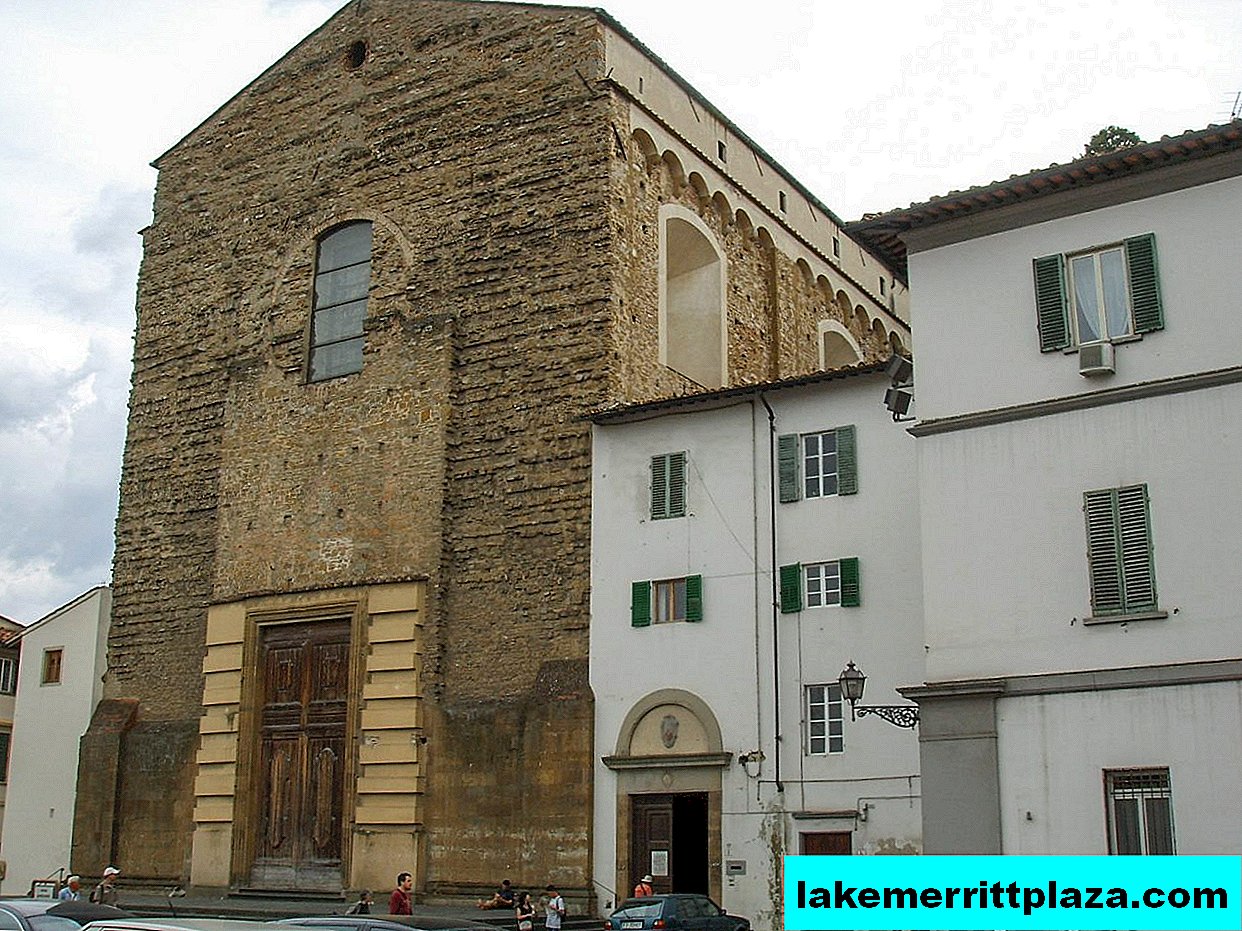
Church of Santa Maria del Carmine (Santa Maria del Carmine) (photo: Sailko)
The church of Santa Maria del Carmine (Santa Maria del Carmine) was erected in the XIV century and was almost completely rebuilt after the fire in 1771. The temple is dedicated to the Madonna of the Carmelite Order and is known throughout the world for its unique frescoes by Masaccio and Filippino Lippi.
Basilica of Santa Croce
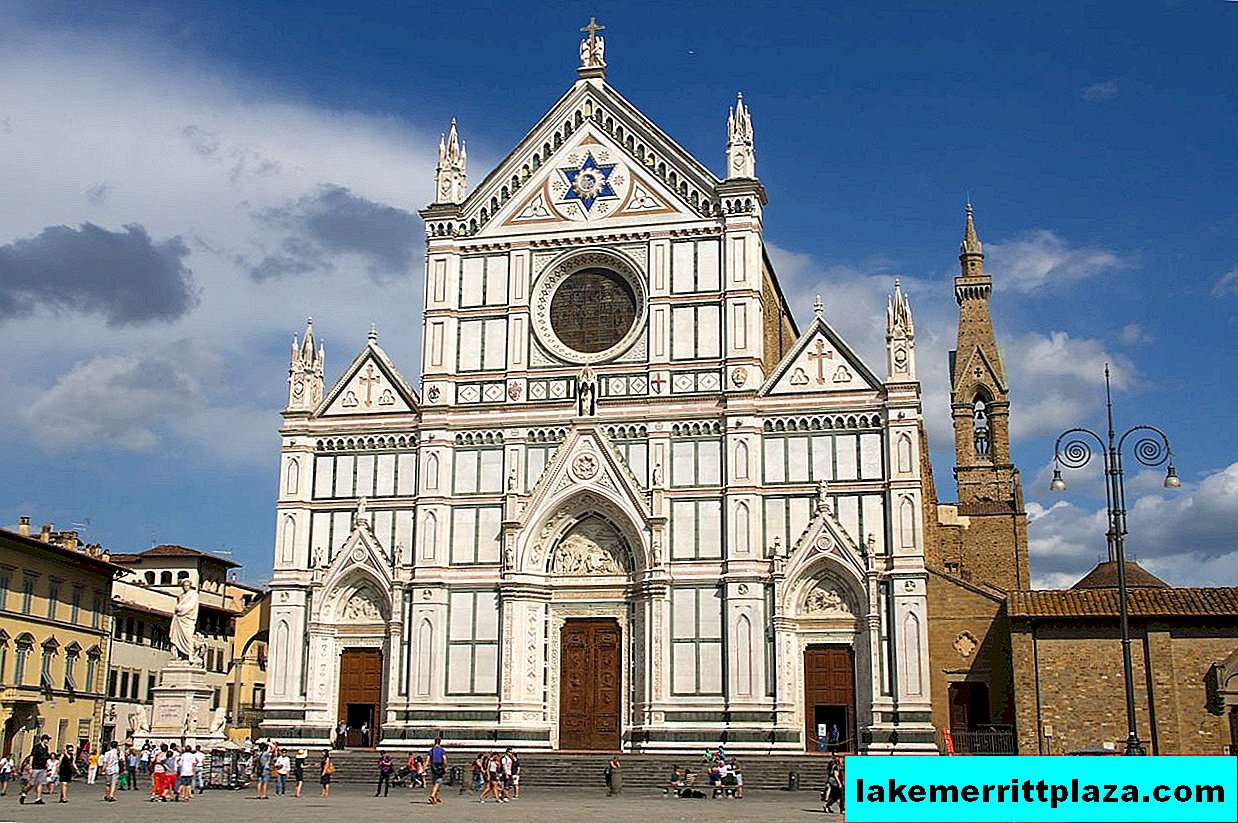
Basilica of Santa Croce (Basilica di Santa Croce)
The Santa Croce Basilica (Basilica di Santa Croce) is the largest Franciscan church in the world. It is famous for the frescoes of Giotto and the tombs of the great people of Italy. The temple was made in the shape of an Egyptian cross, and lancet arches rushing upwards create a special sacredness of this place.
Orsanmichele Church
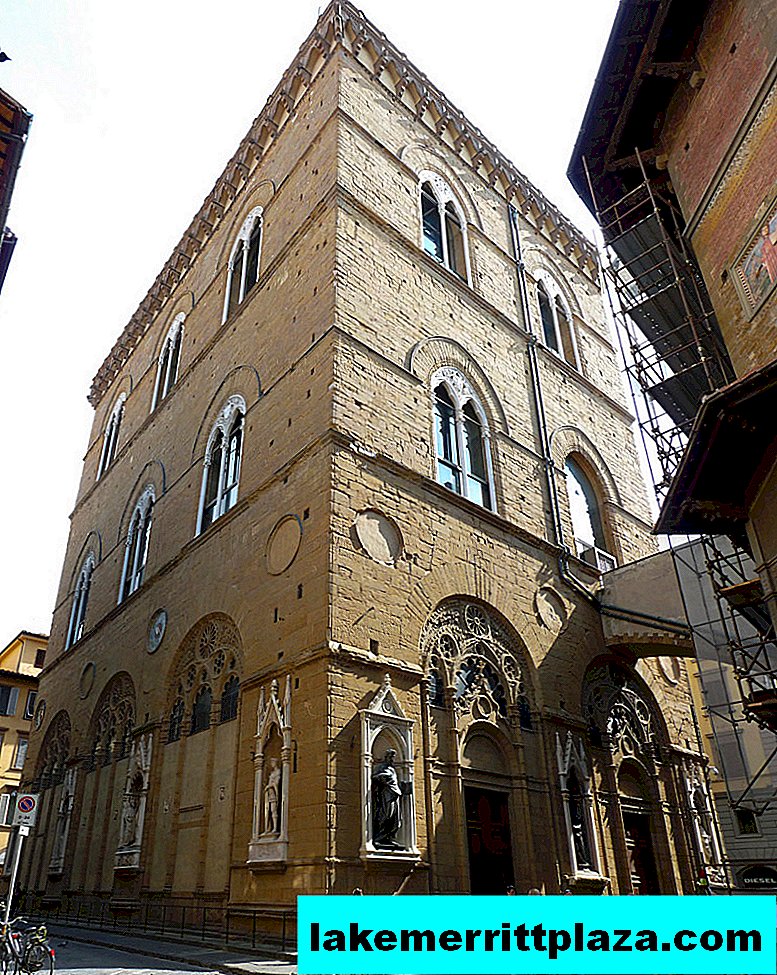
Orsanmichele Church (Chiesa di Orsanmichele) (Photo: Allan Parsons)
The Church of Orsanmichele (Chiesa di Orsanmichele) is perceived in a completely different way. The unique structure of the XIV century, which managed to combine the functions of a temple and a granary. The power fanned by gloomy tones, the greatness underlined by the Gothic style, this is this temple. The church is decorated with sculptural compositions of patron saints, which are its main attraction.
Basilica of San Lorenzo
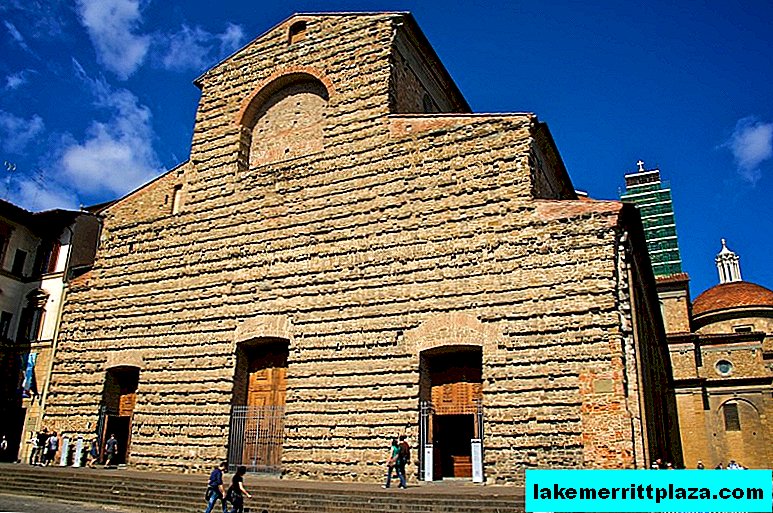
Basilica of St. Lawrence
Basilica of San Lorenzo (Basilica di San Lorenzo) - one of the oldest churches in Florence (393 year). It houses a large number of works of art, precious materials and revered relics. The Basilica unites many famous names: Filippo Brunelleschi, Donatello, Antonio Manetti, Filippo Lippi, Desiderio da Settignano ... In addition, there is the tomb of the noble Medici family, the tombstones of which are decorated with the works of Michelangelo.
Signoria Square
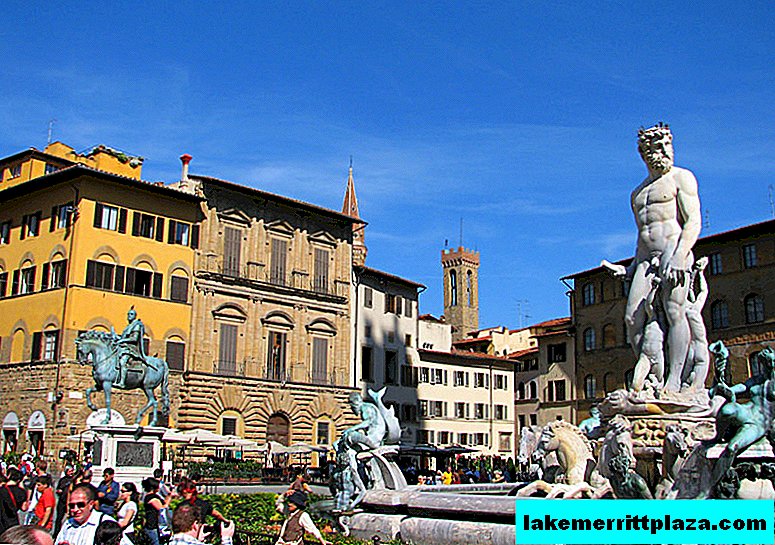
Signoria Square (Piazza della Signoria) (photo: Been Around)
Piazza della Signoria can compete in popularity with the Duomo Square. This is the center of the political life of Florence and its calling card. The Neptune Fountain, designed by the famous Ammanati, saves from the heat in the square. Through the water spray you can see the marble statue of the sea lord, who controls the swift horses. Along the edges are mythical bronze sea creatures. Neptune's face resembles Cosimo I of Medici - the sculptor expressed his gratitude to his customer and emphasized the rule of Florence at sea.
Vecchio Palace
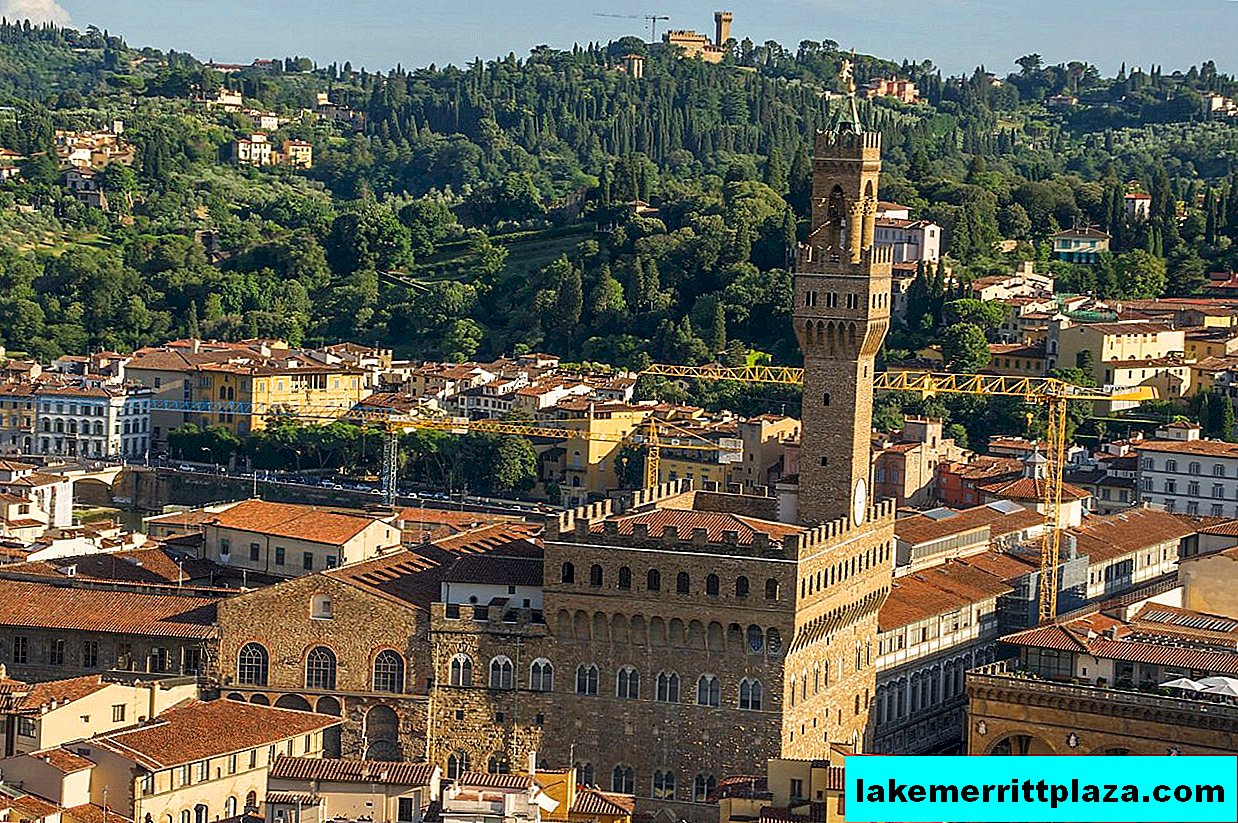
Vecchio Palace (Palazzo Vecchio)
The true decoration of Piazza della Signoria is the Palazzo Vecchio or Palazzo della Signoria. Having grown on the foundation of an ancient tower, the 94-meter Arnolfo Tower is one of the most recognizable symbols of Florence. Outside, the palace is massive, but inside is a real storehouse of genuine art triumph. Today in the palace is the town hall and art museum. Here you can see the sculptural group created by Michelangelo, the paintings and sculptures of Domenico de Rossi, the work of Vasari.
Palazzo pitti
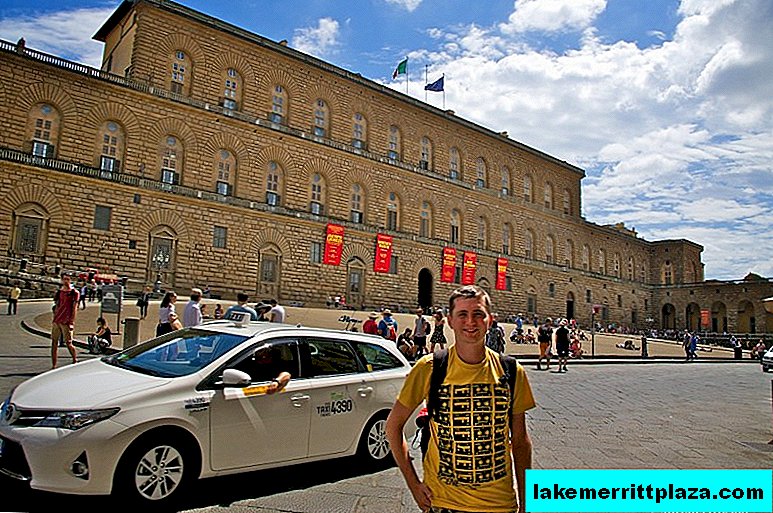
Pitti Palace (Palazzo Pitti)
If you go down from Piazza Signoria down to the south coast of Arno, the road will lead to another iconic landmark of Florence - the Palazzo Pitti. The palace was built for the family of the Florentine aristocrat Luca Pitti. This is a symbol of the power of an influential aristocracy. In its magnificent halls lived the Dukes of Lorraine, Tuscan, and for some time he was the residence of the Italian king.
Today, the palace is one of the most popular museum complexes in Florence, which houses the Palatine Gallery, the Gallery of Modern Art, the Porcelain Museum, the Silver Museum, the Costume Gallery and the Museum of Carriages.
Boboli Gardens
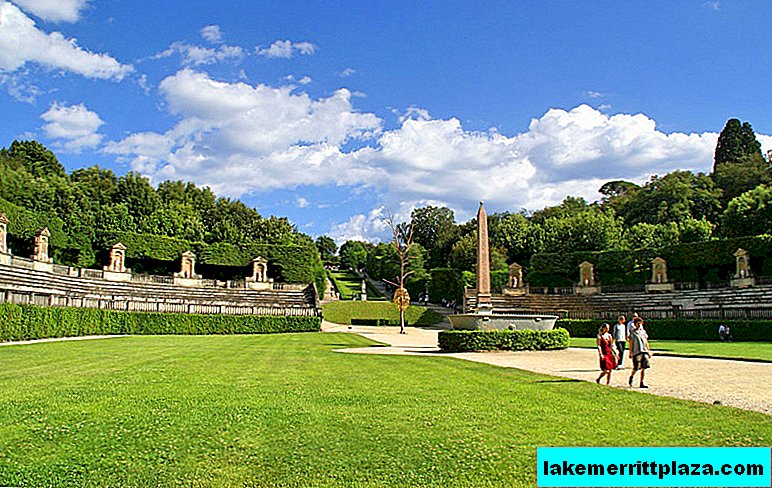
The Boboli Gardens (Giardino di Boboli) (photo: HEN-Magonza)
Near the Palazzo Pitti there is an open-air garden sculpture museum - the Boboli Gardens (Giardino di Boboli). This is one of the most famous works of gardening art of the 16th century: quiet grottoes, gurgling fountains, scattering paths and thoughtfully looking at visitors' statues, which were also looked at by the Roman of antiquity. Boboli Gardens offer magnificent views of the city.
Eleanor Toleda, wife of the Medici, ordered to set up a grand park, on the model of which the best parks in Europe were subsequently created, including the park of Versailles.
National Museum
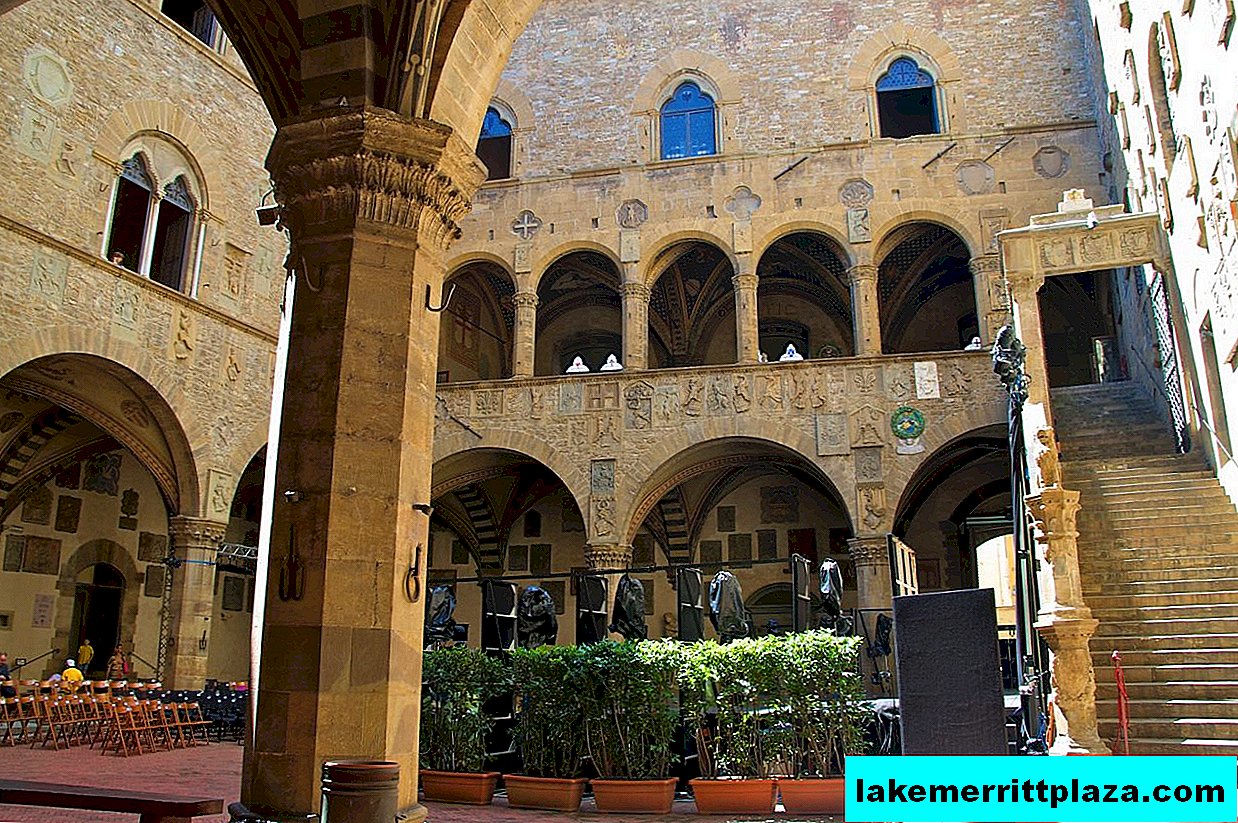
Bargello Courtyard (Museo nazionale del Bargello)
One hundred meters from Piazza della Signoria is another place of worship for travelers - the National Museum (Bargello). The building itself was erected around 1255. It was built as a fortress capable of withstanding any battle. Behind the impregnable walls of the palace is hidden the history of sculpture in Italy. The works of medieval masters are exhibited here, separate rooms are dedicated to the brilliant creations of Donatello and Michelangelo. No less interesting are the collections of carpets, knightly armor and terracotta figurines located on the second floor of the museum.
Uffizi Gallery
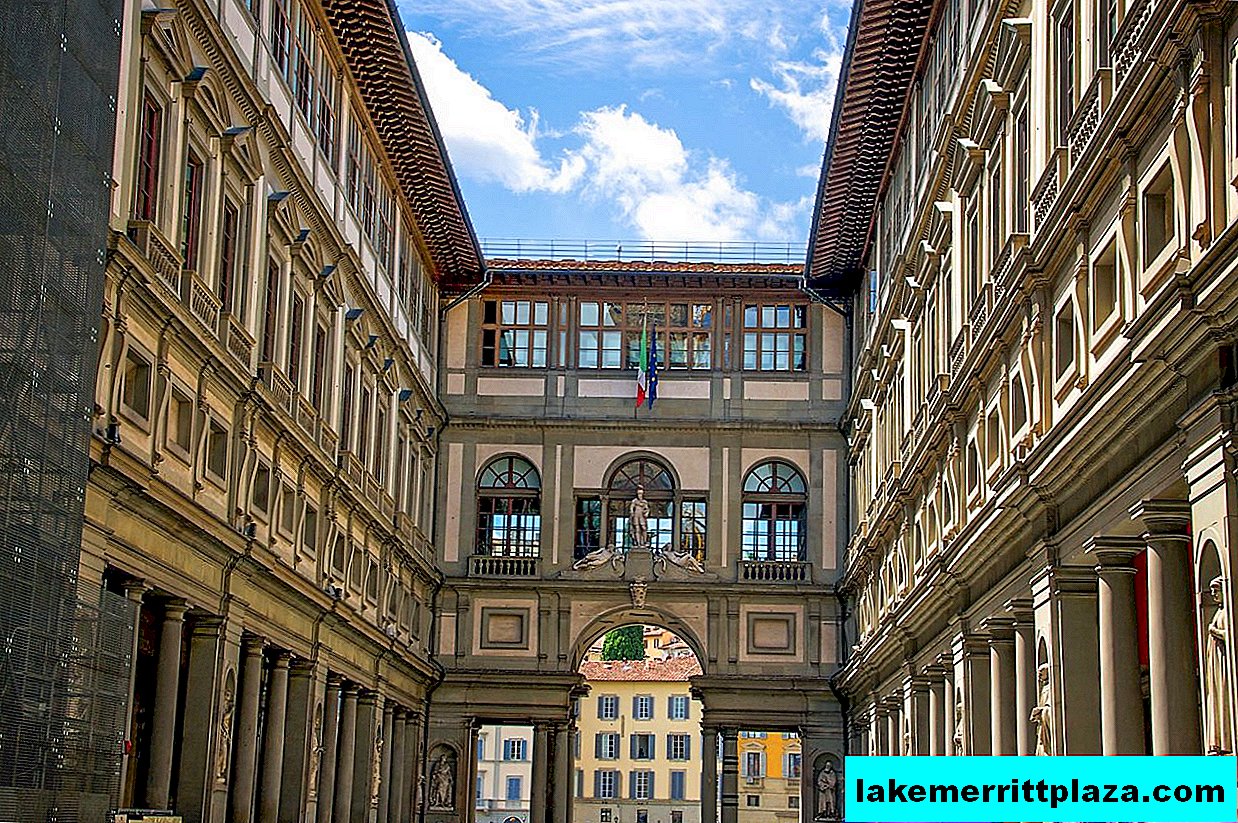
Uffizi Gallery (Galleria degli Uffizi)
The greatness of cultural heritage, its intimacy, mystery and indescribable beauty can be fully felt in another Florentine museum - the Uffizi Gallery (Galleria degli Uffizi). The gallery building itself is an outstanding work of art, erected in the middle of the 16th century by decree of the Duke of Medici, a passionate lover and admirer of art. It is the collection collected by the Medici that forms part of the foundation of the modern gallery. Also, hundreds of tourists come here daily to see the works of Michelangelo, Botticelli, Leonardo da Vinci, Rembrandt, Caravaggio.
Ponte Vecchio Bridge
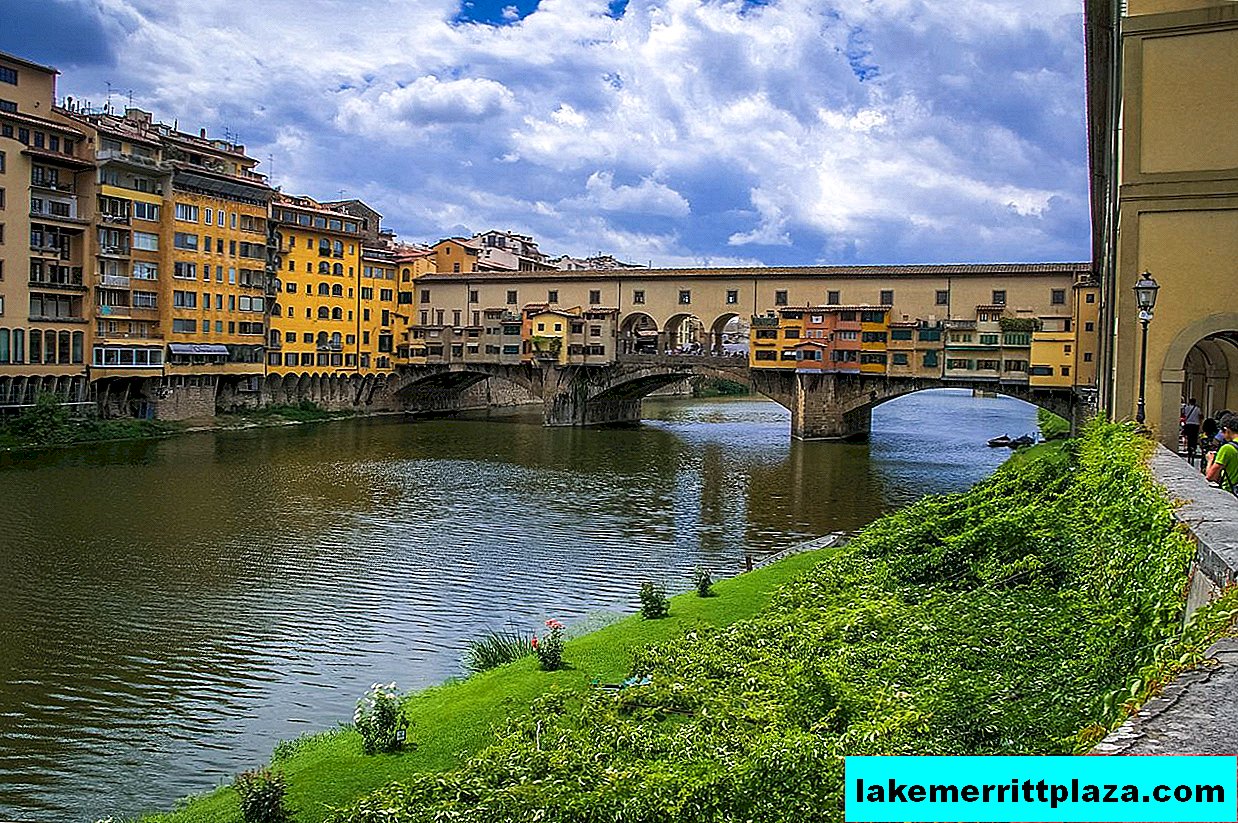
Ponte Vecchio Bridge
And of course, you can’t visit Florence and not stand on the Ponte Vecchio bridge. In 1345, this stone structure, thanks to the mastery of Neri di Fioravanti, connected the two banks of the Arno River. Initially, meat trade was conducted near the bridge, but Ferdinand I, annoyed by the oppressive stench, ordered the construction of jewelry shops in place of the butchers' shops. So the three-arch construction pretty soon overgrown with houses on both sides and received the nickname "Golden Bridge".
Marchingt in Florence for 1 day →Events, Holidays, Events in Florence
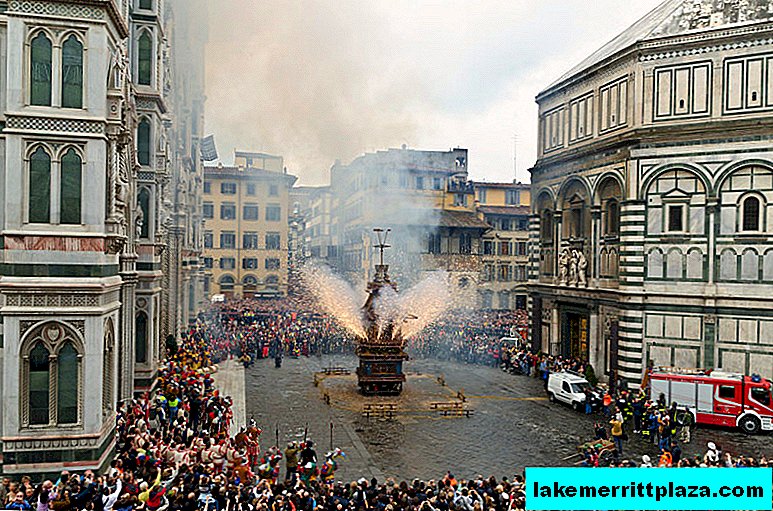
Easter in Florence (Scoppio del carro) (photo: Umberto Fedele)
If you plan to visit Florence in advance, then a good decision would be to coincide with one of the events celebrating the city in a big way.
Lantern Festival
On September 6 - 7, a lantern festival (Festa della Rificolona) takes place on the streets of Florence every year. They say that this tradition is rooted in the distant past, when peasants hurrying to the fair hid candles from the wind and rain that illuminate their path. These days, thousands of people, to the sound of old songs, go out into the street, holding a stick in their hand, crowned by a luminous flashlight.
Easter in Florence
On Easter Day (Scoppio del carro), white oxen transport a cart full of the first spring flowers through the city to the Cathedral of Santa Maria del Fiore. The ceremonial procession is accompanied by musicians dressed in medieval costumes, and after the Mass at Cathedral Square, the archbishop sets fire to a cart with pyrotechnics, symbolizing the sacred fire, with the help of a skillfully made rocket in the form of a dove.
May Music Festival
Since 1933, a tradition was born in Florence to hold the May Music Festival (Maggio Musicale Fiorentino), during which the city lives and breathes music, turning into a grand stage.
Weather in Florence

Summer in Florence
The climate of the city is determined by its low location: the height of Florence above sea level is only 50 meters. In winter, under the influence of the dry continental masses of the Arctic, air temperature rarely rises above 10 ° C, but in summer, when the influence of western air flows dominates, it reaches heat at a peak of the season 30-40 ° C. Spring and autumn are pleased with a comfortable temperature.
How to get to Florence
When traveling to Florence, it should be remembered that there is no direct flight from Moscow to Florence. The best option is to fly through Rome, and then move through Italy.
Comfortable trains follow from Rome to Florence; travel time is an hour and a half. Flight by plane will take about an hour. Trains come to Florence from Rimini, Bologna, Milan, Verona, Venice, Pisa. There is also a bus service between the cities.
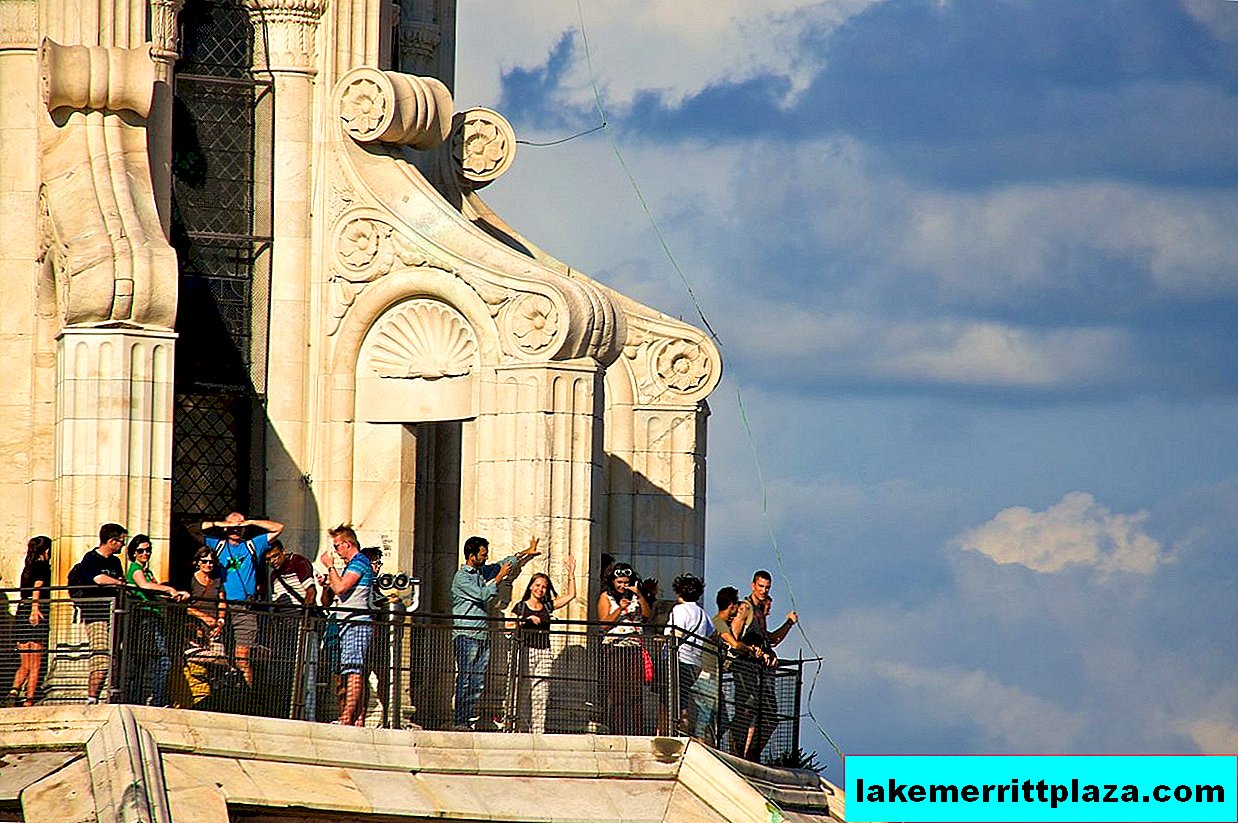
On the tower of the cathedral
History of Florence
The history of the city began more than 2000 years ago. Scientists do not know the exact date of the founding of Florence, it is only known that the Etruscan tribes were the first to settle on this land, then the Roman legionnaires came here and in 59 BC they broke up a settlement for veterans who perfectly fulfilled their military duty to protect the great emperor. Florence ("blooming"), so called this settlement. Legend has it that the city was laid down by Julius Caesar.
In the IV century, the city served as the residence of the bishop, was subordinate to Byzantium, the Ostrogoths and the Franks, and only in the XII century gained independence, becoming a commune. Craft workshops began to develop. The heyday of crafts and art in the XIV-XVI centuries marked the golden age of the city, it became the cultural and financial center of Europe. In Florence, even minted their coin.
In 1434, the Medici dynasty came to power. Florence has become the capital of the arts.
In 1448, a plague raged in the city, killing many lives.
From 1865 to 1871, Florence was the capital of the Italian kingdom.
The bombing during World War II caused significant damage to the city. When the Nazis retreated, they blew up all the historical bridges across Arno. Only the Vecchio bridge was saved.
November 4, 1966 a flood hit the city. Many works of art have been lost or damaged.
What's interesting around Florence?
 Pisa
Pisa
 Vinci
Vinci
 Fiesole
Fiesole
 Greve in Chianti
Greve in Chianti
 Munyana Castle
Munyana Castle
 Wicciomaggio Castle
Wicciomaggio Castle
 Verrazzano Castle
Verrazzano Castle
Fiesole
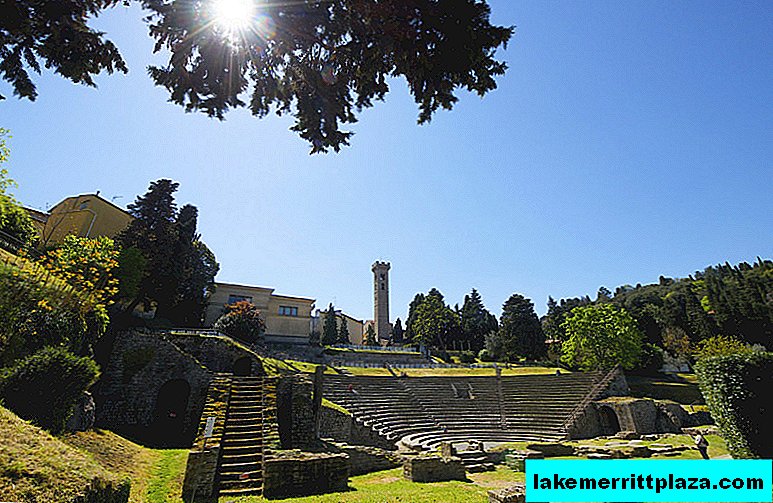
Fiesole City (photo: Kristoffersonschach)
The city of Fiesole is located on a steep hill, just 8 km from Florence. It offers a gorgeous view of the Arno Valley and the beautiful Florence. Fiesole itself is famous for the archaeological museum and the Roman theater, built in the 1st century BC. From Florence to Fiesole runs bus number 7, the journey time is 30 minutes.
Pisa

Pisa
The world famous city of Pisa and its famous tower, which has the status of world heritage, is also a place of pilgrimage for tourists. The distance to Pisa is about 70 km, the journey will take - 1 hour 15 minutes if you go by train.
Pisa Travel Guide →Vinci
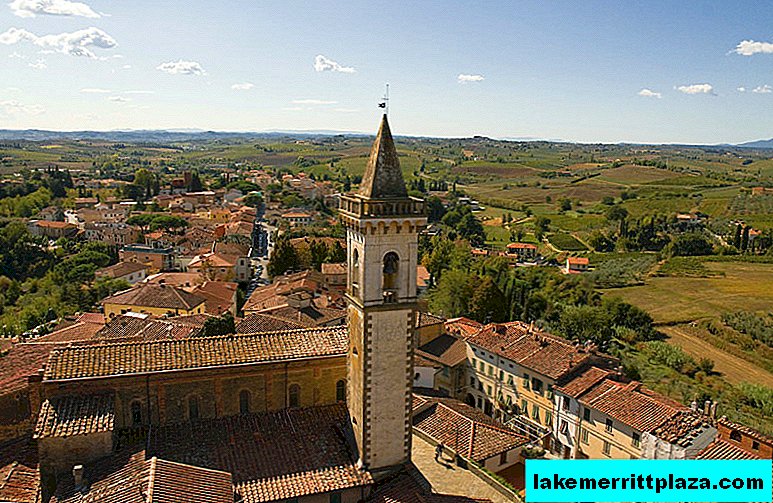
Vinci (photo: J. D.)
40 km from Florence there is a place where Leonardo da Vinci was born. This is the city of Vinci. Its history is rich, architectural monuments (Castle of Counts Guidi, Church of the Holy Cross, Leonardo Museum) and traditional festivals ("Unicorn Festival", reconstruction of a Renaissance dinner) speak of this.
Greve in Chianti




In the small commune of Greve in Chianti, you can enjoy the silence of the Italian province and the bewitching beauty of its nature. The commune is located south of Florence in the most famous wine region of Tuscany - Chianti. Greve is surrounded by numerous villas, castles and monasteries where wine tasting is held. Therefore, those who want to bring wine and olive oil from Italy should definitely visit these places.
What to buy in Florence?
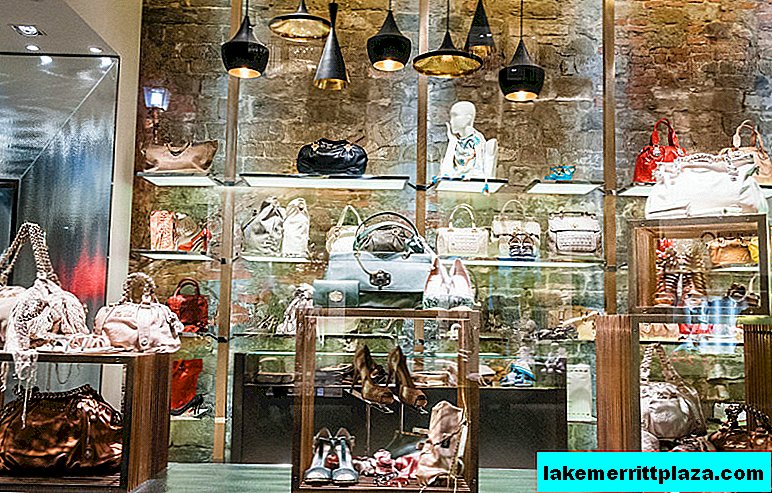
Florence shops (photo: Robert Stokes)
It is impossible to leave Italy without shopping. Florence shops offer a huge range of products. Of particular interest for shopping are leather goods, hand-embroidered underwear, clothes of famous Italian brands, designer clothes, perfumes, marble paper, wine and gold, which are still traded on the Golden Bridge.
I wrote in more detail about shopping in Florence here.
How to get from Rome to Florence
I considered all possible route options in this article ...

